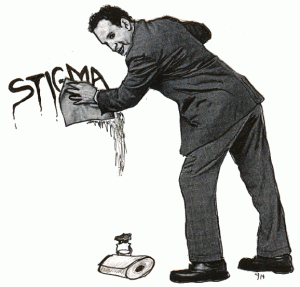Monk producer advocates for accuracy of disease portrayal
By Kacey Deamer
Adrian Monk, the well-known title character of USA’s hit TV show Monk, is afraid of milk, won’t shake your hand without a disinfecting wipe to follow and is an extremely gifted detective. By now, American audiences know about the show, which focuses on Monk’s Obsessive Compulsive Disorder, which one of the show’s taglines deems both “a gift and a curse.”
Like Monk, other shows and movies have attempted to portray OCD in their plotlines. But using a mental disorder in the media such as OCD can have both negative and positive effects. If done correctly, the media can help improve awareness of such illnesses. However, an incorrect portrayal can create a misunderstanding about the disorder, as well as offend those who have OCD.
Ithaca College professor Bill Hudenko, an expert in clinical psychology, has treated clients who have OCD. He explained that in order for someone to be diagnosed with the disorder, they must have persistent anxieties and repetitive behaviors to combat the anxiety, which result in at least a daily impairment of one hour. Although “cleanliness is commonly portrayed in the media,” according to Hudenko, as one of the common obsessions associated with OCD, it is not the only one.
“For the most part, the media doesn’t correctly portray the [OCD] diagnoses,” Hudenko said. The most accurate portrayal he’s seen was Jack Nicholson’s character Melvin Udall in the 1997 film As Good As It Gets. Still, the media uses OCD more as a form of entertainment than a portal for awareness.
Sal Savo, writer and co-producer of Monk, said, “Executive producer David Hoberman has personal experience with the disorder, and research was certainly done by executive producer Andy Breckman and Tony Shalhoub [the actor who plays Adrian Monk] early on.” Savo said the entertainment value of Monk is always the writers’ first concern, but “we do it without disrespecting the seriousness of what Monk goes through.”
The Anxiety Disorders Association of America has supported Monk and its help in increasing awareness. According to an article in Variety, ADAA CEO Jerilyn Ross said, “Even as a comedy, the show demystifies this mental illness respectfully and makes people aware of what someone suffering from OCD experiences.”
The Variety article mentioned the co-creator of Monk, Hoberman, serves on ADAA’s board. Hoberman has also received a Voice Award that was co-sponsored by the American Psychiatric Foundation for his and the show’s efforts.
Hudenko admits he is not an expert when it comes to the media, but he feels strongly that the media “absolutely” affects society’s perception of OCD and mental illnesses in general. He has seen clients who have self-diagnosed and have self-treated incorrectly based on what the media has depicted.
Savo was realistic when discussing the show’s portrayal of OCD. “Whether or not [the show’s staff] always do a perfect job of depicting the disorder,” he said, “I think the show has succeeded in raising awareness and maybe making sufferers feel a little less alone.”
In an interview with the University of California’s Santa Barbara Independent, doctoral student Rene Staskal said OCD has been stereotyped as “the hand-washing disorder” because “‘most people think of OCD as it’s portrayed in Monk.’” She said there are actually four factors of obsessional thought: germ contamination, item placement, doubting and intrusive thought.
However, the show has received numerous awards because it disputes the stigma that people with OCD face. The show portrays Monk as having the ability to carry on a profession and achieve goals, which gives him a positive identity as a person with OCD.
It seems there will never be a perfect representation of OCD in the media. However, progress is being made to correctly portray this disorder in a discerning way. Although it has its critics, Monk has done a lot for OCD awareness. The cast of Monk and Hoberman have done a few public service announcements about OCD —what the disorder is and how it can be treated. So while the show itself may not be a perfect portrayal of OCD, it has given its audience a familiarity with the disorder.
____________________________________
Kacey Deamer is a freshman journalism major. She does not have OCD. Not that there’s anything wrong with that. E-mail her at kdeamer1@ithaca.edu.

